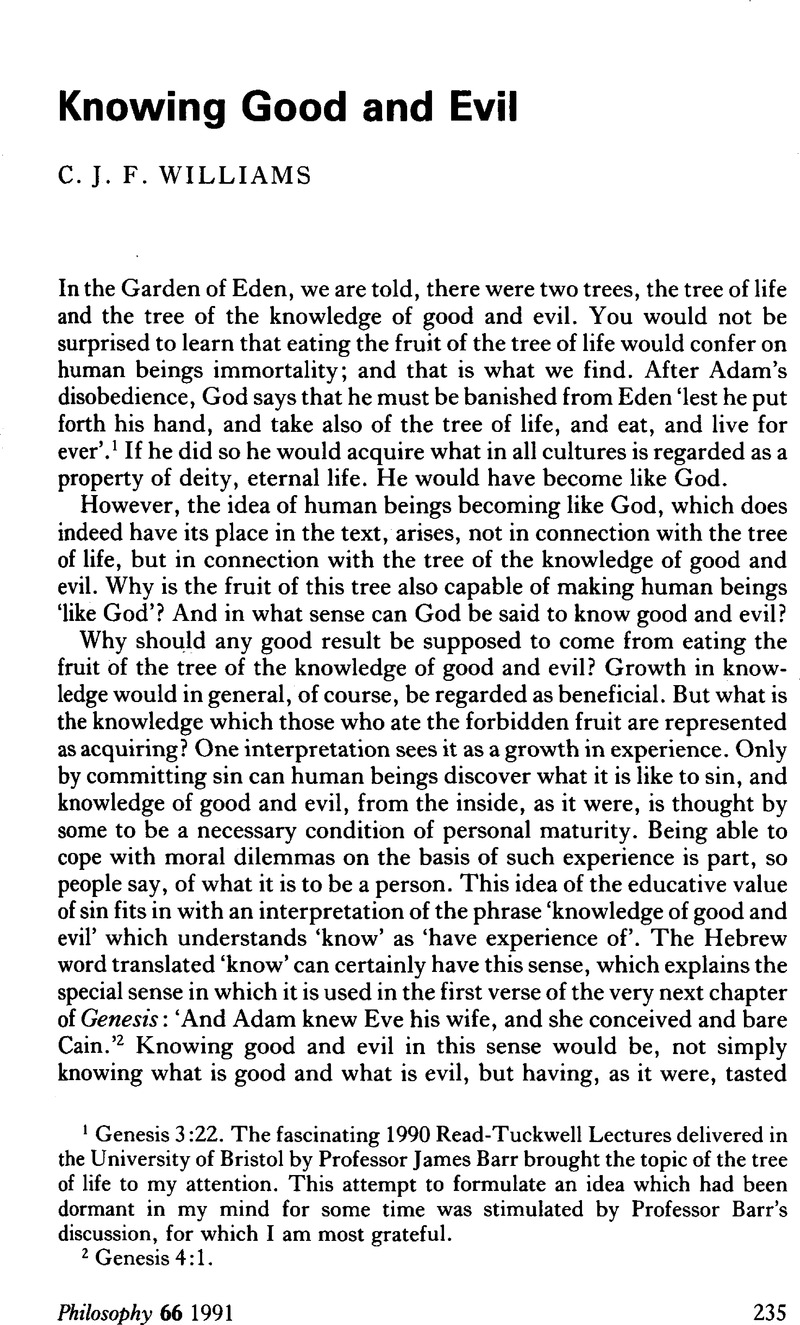Article contents
Knowing Good and Evil
Published online by Cambridge University Press: 30 January 2009
Abstract

- Type
- Discussion
- Information
- Copyright
- Copyright © The Royal Institute of Philosophy 1991
References
1 Genesis 3:22. The fascinating 1990 Read-Tuckwell Lectures delivered in the University of Bristol by Professor James Barr brought the topic of the tree of life to my attention. This attempt to formulate an idea which had been dormant in my mind for some time was stimulated by Professor Barr's discussion, for which I am most grateful.
2 Genesis 4:1.
3 Swinburne, R. G., The Coherence of Theism (Oxford: Clarendon Press, 1977), 179–183Google Scholar; The Existence of God (Oxford: Clarendon Press, 1979), Ch. XI.Google Scholar
4 Davies, Brian, O. P., An Introduction to the Philosophy of Religion (Oxford: Oxford University Press, 1982), 22–24.Google Scholar
5 Essays in Satire (London: Sheed and Ward, 2nd edn, 1954), 32–33.Google Scholar
6 Plato, , Protagoras, 352a–357e.Google Scholar
7 Hare, R. M., Freedom and Reason (Oxford: at the Clarendon Press, 1963), 78.Google Scholar
8 Those who accept the possibility of supererogatory action will not see every choice of an action less good than another action possible at the time as morally wrong. So it is not a sufficient condition for them of a choice being blameworthy that it be the choice of a less good action known to be less good: it is, however, a necessary condition.
9 Eth. Nic. 1170b 6. The usual translation ‘another self’ does not capture the full flavour of Aristotle's oxymoron. The use of ‘self’ in philosopher's English, as a common noun, obscures the sense of the Greek, which might almost be rendered ‘other same’. The Greek ‘autos’ is used to express the concept of same as well as that of self: indeed, as I have argued in chapter 4 of What is Identity? (Oxford: Clarendon Press, 1989), they are the selfsame concept.Google Scholar
10 I John 4:8.
11 Swinburne, R. G., ‘Could There Be More Than One God?’, Faith and Philosophy, vol. 5, 1988.CrossRefGoogle Scholar
12 Genesis, 3:5. The Hebrew word translated ‘God’ here is in the plural. It does not follow that ‘gods’ is the correct translation here, because this word has no singular, and it is regularly used in the Old Testament to indicate the Creator of Heaven and Earth. Thus the word translated ‘God’ in the first verse of the Book of Genesis, ‘In the beginning God created the heavens and the earth’, is this same plural noun. However, verse 22, near the end of chapter 3, where the present verse is recapitulated, has the surprising phrase ‘he has become one of us, to know good and evil’, where the word ‘we’ is unquestionably plural. There have been Christians, no doubt, who would have avoided the translation ‘gods’ in verse 5, and would have interpreted the plural ‘we’ in verse 22 as a prophetic reference to the plurality of persons in the Godhead. Without taking this heroic line, I think that it would be possible to sustain the interpretation I am suggesting of knowledge of good and evil on the part of God, even if the author of this passage is supposed to have been speaking of gods as a race to which the creator of Adam and Eve belonged. It could still be supposed that what it is to be a god, from the creature's point of view, is to be a creator, even if there were many creators. And it could still be maintained that acting without a sufficient reason is a characteristic of creation. But there are difficult questions about possible ways of understanding scripture here, which need not be settled now. Do we need to hold that the human author of this passage was fully aware of the meaning of what he wrote?
- 1
- Cited by


